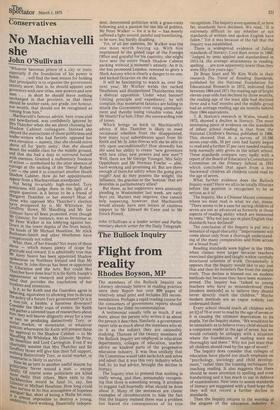Conservatives
No Machiavelli she
John O'Sullivan
"Whoever becomes prince of a city or state, especially if the foundation of his power is feeble . . :will find the best means for holding that principality is to organise the government entirely anew; that is, he should appoint new governors with new titles, new powers and new men . . . in short he should leave nothing unchanged in that province, so that there Should be neither rank, nor grade, nor honour, nor wealth, that should not be recognised as coming from him." Machiavelli's famous advice, here truncated and bowdlerised, was confidently ignored by Mrs Thatcher when she set about choosing her Shadow Cabinet colleagues. Instead she obeyed the instructions of those politicians and
leader-writers who had fiercely opposed her
own elevation — namely, that she should strive above all for 'party unity', that she should desert the middle class for the middle ground, and that she had a duty to surround herself With enemies. Granted a moThentary freedom of action — symbolised by the utter absence of outrage at the sacking of the 'liberal' Robert Can' — she used it to construct another Heath Shadow Cabinet. How do her appointments appear from a Machiavellian standpoint? Not being invariably high-minded, Tory Politicians will judge them in the light of a simple question: is it better to be a friend of Margaret Thatcher or her enemy? Most of those who opposed Mrs Thatcher's election have prospered by it. Mr Whitelaw, Sir Geoffrey Howe, Mr Maudling and Mr Ian Gilmour have all been promoted, even though Mr Gilmour, for instance, was as ferocious as Mr Peter Walker in his lobbying against her. Down in the lower depths of the front bench,
the heads of Mr Michael Heseltine, Mr Alick Buchanan-Smith and other Heathmen have conspicuously not rolled.
What, then, of her friends? Not many of these about — which means plenty of scope for gratitude and reward. It is admittedly true that Mr Airey Neave has been appointed Shadow sPokesm an on Northern Ireland and that Mr Norman St John-Stevas has been re-appointed to Education and the Arts. But could Mrs Thatcher have done less? It is Sir Keith Joseph's
appointment as research and policy mastermind that provides the touchstone of her loyalties and intentions.
Is it, as Sir Keith and the Guardian agree in oelieving, equivalent to allowing him to dictate
the policy of a future Tory government? Or is it a. non-job, a bauble, a harmless diversion? Consider the likely train of events. Sir Keith 1179 gather a talented team of researchers about ;
Im; they will beaver diligently away for a year or two on producing distinctively Tory, or social market, or monetarist, or whatever
p°Iicies; whereupon Sir Keith will present these !&11. approval to the Shadow Cabinet — to Mr maudling, Mr Whitelaw, Mr Gilmour, Mr Prior, c_ r Heseltine and Lord Carrington. Even if we Geoffrey assume that Mrs Thatcher and Sir nothing Howe will give him their full support, _othing distinctively Tory, or social market, or rno.rletarist is likely to survive. hn,1\1. NOW let us turn to another useful maxim for Fa'-'t'IttIcians: Never wound a man — except more Of course some politicians are killed baorie easily than others. Mere exile to the Girthenches would be fatal to, say, Ian mour or Michael Heseltine. How long could 1:neY survive in its thin atmosphere of hopeless intrigue, it is • But, short of hiring a Mafia hit-man, am,i. "'most impossible to destroy a young, Dtious, hard-working, financially indepen
dent, determined politician with a grass-roots following and a passion for the life of politics. Mr Peter Walker — for it is he — has merely suffered a light wound, painful and humiliating, to be sure, but hardly disabling.
Yet, of all her enemies, Mr Walker was the one most worth buying up. With him imprisoned in the gilded cage of the Foreign Office and grateful for his captivity, she might have sent the entire Heath Shadow Cabinet packing without a moment's anxiety. As it is, she has promoted Lepidus, restored to glory a Mark Antony who is clearly a danger to no one, and kicked Octavius on the shin.
It will be fascinating to watch as, over the next year, Mr Walker welds the sacked Heathmen and disappointed Thatcherites into a disloyal opposition. Under what banner? Uniting principle and expediency, he will complain that monetarist fanatics are failing to attack the Government over rising unemployment and thereby losing valuable votes. And Mr Heath? For him, I fear, the unrewarding role of totem.
Which brings us back to Machiavelli's advice. If Mrs Thatcher is likely to meet occasional rebellion from the disappointed, how many loyal subordinates apart from Sir Keith and Mr St John-Stevas will she be able to rely upon unconditionally? How shrewdly has she used her ability to create "new governors with new titles, new powers and new men"? Well, there are Mr George Younger, Mrs Sally Oppenheim and Mr Norman Fowler — able, hard-working and promising all. But are there enough of them-for safety when the going gets rough? And do they possess the weight, the influence, the gravitas or the 'bottom' that are desirable in parliamentary allies?
But these, as her supporters were anxiously pleading in Westminster last week, are early days yet. Matters may improve. One cannot help suspecting, however, that Machiavelli would • already have sent letters of cautious support to Mr Edward du Cann and to Mr Enoch Powell.
John O'Sullivan is a leader writer and Parliamentary sketch writer for the Daily Telegraph

































 Previous page
Previous page